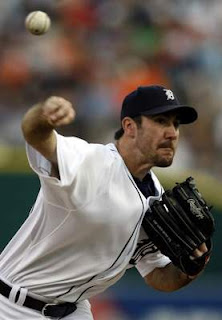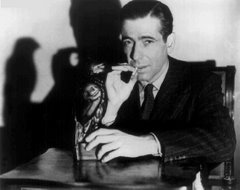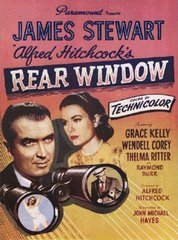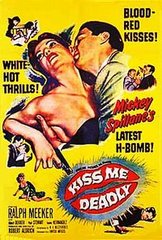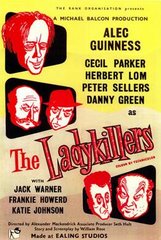Monday, December 10, 2007
Never go with a hippie to a second location
But I'm not a hippie anymore, so you can make the trip:
12 Grand In Checking
I'm doing this mostly 'cause I lost my mind while student teaching for three months and I just want to get all crazy and shite. Who knows what I'm gonna write about at the new 'spot, but there will be plenty (plenty! I say) movie stuff. Please follow. Or not. But do. Please. It's like this blog only more low-rent and less bad.
12 Grand In Checking
I'm doing this mostly 'cause I lost my mind while student teaching for three months and I just want to get all crazy and shite. Who knows what I'm gonna write about at the new 'spot, but there will be plenty (plenty! I say) movie stuff. Please follow. Or not. But do. Please. It's like this blog only more low-rent and less bad.
Monday, September 10, 2007
Saturday, August 25, 2007
Black Peter
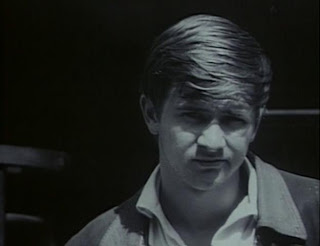 [N.B.: I will be discussing certain events in the film, including the end; the film doesn't have a very strong "narrative" however, so I hesitate to write that this post contains "spoilers" because there's really not much to spoil]
[N.B.: I will be discussing certain events in the film, including the end; the film doesn't have a very strong "narrative" however, so I hesitate to write that this post contains "spoilers" because there's really not much to spoil]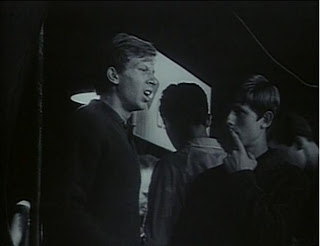 Right in the middle of Milos Forman's Black Peter (1963) there's an extended sequence at a dance where we spend the majority of our time observing two losers as they try to pick up dates. Our main character, Peter, pops up occasionally, but in this particular sequence he seems like a cameo in his own film. There's a lot of awkward humor, and rock & roll, and it's all shot cinema verite-style, so it's perfect early Forman. What I especially loved about the sequence was the way Forman focuses (almost) exclusively on these two nerds (who were introduced in an earlier scene as dimwitted antagonists in a side plot) and slowly reveals their humanity. It's a long digression in a film that doesn't have much of a narrative to begin with, but it's got everything I love about Forman's Czech films: it's hilarious, true, unpredictable, and ultimately, humanizing. Forman shows us his characters' weaknesses, not just to ridicule them, but to humanize them. He enjoys making fun of the characters but he's never cruel about it.
Right in the middle of Milos Forman's Black Peter (1963) there's an extended sequence at a dance where we spend the majority of our time observing two losers as they try to pick up dates. Our main character, Peter, pops up occasionally, but in this particular sequence he seems like a cameo in his own film. There's a lot of awkward humor, and rock & roll, and it's all shot cinema verite-style, so it's perfect early Forman. What I especially loved about the sequence was the way Forman focuses (almost) exclusively on these two nerds (who were introduced in an earlier scene as dimwitted antagonists in a side plot) and slowly reveals their humanity. It's a long digression in a film that doesn't have much of a narrative to begin with, but it's got everything I love about Forman's Czech films: it's hilarious, true, unpredictable, and ultimately, humanizing. Forman shows us his characters' weaknesses, not just to ridicule them, but to humanize them. He enjoys making fun of the characters but he's never cruel about it.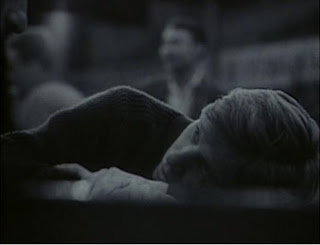 It's not that Forman drops his dark humor -- he continues to ridicule the characters for their sad-sackhood and social awkwardness. But he doesn't let the audience get away with easy laughs either; he forces us to recognize ourselves in these characters, to see that we could be the butt of the joke just as easily if a camera were around to document all the embarrassing and painful moments of our own youth. Forman makes fun of his characters (and he can be brutal and black in his humor), but he always manages to give a moment -- a fleeting look, a line of dialogue, a small action -- that complicates things and makes the ridiculous character suddenly the saddest and most vulnerable. Fans of shows like The Office would find a lot to love in Forman's Czech films.
It's not that Forman drops his dark humor -- he continues to ridicule the characters for their sad-sackhood and social awkwardness. But he doesn't let the audience get away with easy laughs either; he forces us to recognize ourselves in these characters, to see that we could be the butt of the joke just as easily if a camera were around to document all the embarrassing and painful moments of our own youth. Forman makes fun of his characters (and he can be brutal and black in his humor), but he always manages to give a moment -- a fleeting look, a line of dialogue, a small action -- that complicates things and makes the ridiculous character suddenly the saddest and most vulnerable. Fans of shows like The Office would find a lot to love in Forman's Czech films.The dance sequence in Black Peter -- long and rambling, focused primarily on secondary characters, utilizing documentary-style techniques, diagetic use of popular music, etc. -- is a premiere example of Forman's early style. It's shot like a documentary, with the camera acting as observer, weaving in and out of the crowd as various characters try to find dates, get drinks, make jokes, and dance. We watch the drama unfold as if unscripted, as young people struggle (and often fail) to navigate their confusing social lives.
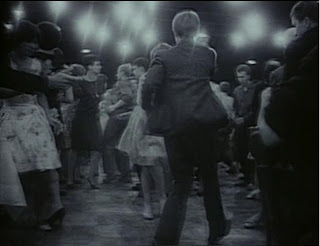 Black Peter is a youth film, a film for and about people moving from adolescence to adulthood that captures all the quiet rebellion, awkwardness, mischief, confusion, and ambivalence that accompanies that age. Since I'm just coming out of (or still stuck in, depending on which day of the week it is...) that period of my life, Black Peter resonated deeply. I was Peter in so many ways -- ambivalent toward work and family, anxious about sexual and romantic relationships, lacking a "proper" direction in life. Peter can be shy and bumbling, or he can be mischievous and sarcastic, and he certainly can't behave with adults in the way adults expect him to behave. He's too individualistic, too bemused, too awkward and yet too rebellious to fit in with the world his father inhabits, or the world of his job, or the social world of his peers.
Black Peter is a youth film, a film for and about people moving from adolescence to adulthood that captures all the quiet rebellion, awkwardness, mischief, confusion, and ambivalence that accompanies that age. Since I'm just coming out of (or still stuck in, depending on which day of the week it is...) that period of my life, Black Peter resonated deeply. I was Peter in so many ways -- ambivalent toward work and family, anxious about sexual and romantic relationships, lacking a "proper" direction in life. Peter can be shy and bumbling, or he can be mischievous and sarcastic, and he certainly can't behave with adults in the way adults expect him to behave. He's too individualistic, too bemused, too awkward and yet too rebellious to fit in with the world his father inhabits, or the world of his job, or the social world of his peers.There's a hilarious scene at the beginning where Peter follows a man he suspects of shoplifting. Peter works at a grocery store where it's his job to spy on the customers and look for possible thieves (obvious parallels to Communism and the police state of course). The scene -- with Peter following the man for blocks, past shops and passersby, trying to confront him over the shoplifting, but like an inept Inspector Clouseau, unable to bring himself to even make eye contact with the man, all while the man casually ignores Peter -- is a cinematic metaphor for those uncomfortable, unsure attempts of young people to navigate an indifferent and seemingly more powerful adult world. Throughout the sequence the man has complete control despite the fact that he's the one being tailed; he's the adult and Peter is reduced to a boy who's merely playing at being a spy.
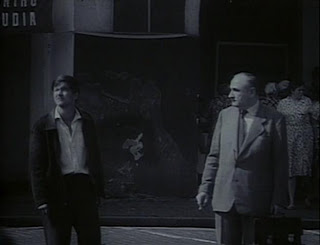 I have to admit, the scene could be a metaphor for my own bumbling experiences with older people. I know that in a lot of my interactions with people several years older than myself, I'm still a "kid" and they're the "adults," and the power in these cases is firmly in the hands of the adults.
I have to admit, the scene could be a metaphor for my own bumbling experiences with older people. I know that in a lot of my interactions with people several years older than myself, I'm still a "kid" and they're the "adults," and the power in these cases is firmly in the hands of the adults.Black Peter explores this theme a lot, not just in work situations but also at home with Peter's parents, and even in the scenes with Peter and other young people. There's an unmistakable sense that Peter is different -- not necessarily smarter or better but certainly a square peg, unable or unwilling to fit himself into the roles people have assigned to him. An alternate title for the film is, in fact, Black Sheep. Peter's cynical humor, lackadaisical ambivalence, and the annoyed frustration that springs from his social awkwardness are all traits with which I identified (and I expect others my age or younger would respond to as well; I'm curious what the middle-aged or older response to the film might be...). And of course, the theme of individualism that runs throughout the film is a response to the conformity and restrictiveness (thanks to Soviet Communism) of Czech life in the '40s and '50s that was only beginning to thaw in the 1960s.
A small victory for Peter, and the individualism and youth he symbolizes, comes in the last scene as Peter must endure yet another lecture from his conformist father. As Peter sits and grows increasingly annoyed by his father's exhortations, suddenly the movie shifts into the absurd and the camera freeze frames on the father, freezing him in mid rant.
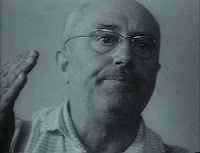
But this is not like the freeze frame in something like Truffaut's 400 Blows, where the frame stops and the film ends. Instead, it's only Peter's father who has been frozen; Peter himself continues to move in his own frame and sits dumbfounded as he witnesses his father's cinematic paralysis. In a bit of self-reflexivity, Forman freezes the film on the father but allows Peter to continue to move and "live" within his own frame, with Peter being fully aware that his father's frame has stopped.
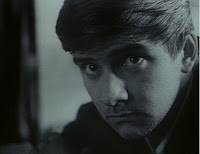 Whether by an act of God, or simply the joking act of some unseen director, Peter is left to shake his head, do a double take, and wonder. The viewer is left with a delightful, if often times dark, comedy about the trials of not quite fitting in.
Whether by an act of God, or simply the joking act of some unseen director, Peter is left to shake his head, do a double take, and wonder. The viewer is left with a delightful, if often times dark, comedy about the trials of not quite fitting in.As far as I know the film is only available in the U.S. from Facets Video in a lousy transfer with terrible subtitles; the subtitles are barely matched up with whoever is speaking and several lines of dialogue are simply not translated. As unfortunate as this is (especially since Forman's other two films from this period -- Loves of a Blonde and Fireman's Ball -- are both available from Criterion) Black Peter is still worth seeing; the awkward humor comes through despite the poor subtitling.
Late Night
Yeah, I stayed up to watch the whole thing. It was surreal, hearing a home run call at 3:30 in the morning. Apparently there's a major league rule that you can't start an inning after 12:59 am, and that the game must then be continued the next day. BUT -- if it's the last time the two teams will meet for the season then that rule is suspended. Such was the case here in Detroit last night/this morning. Heh.
 Wake up Carlos, you just won the game
Wake up Carlos, you just won the game
 Wake up Carlos, you just won the game
Wake up Carlos, you just won the game
Friday, August 24, 2007
Czech New Wave crib sheet
I'm really not into getting all academic or informational on this blog; it's just not my thing. My writing is more in the mode of personal reflections, opinions, occasional rants, and random stuff. I've done enough academic writing in my life that I don't want to spend my leisure hours doing it too.
So, before I start posting about some Czech New Wave films I enjoy I thought I'd link to a couple of brief but informative overviews of the period that will help set the stage for my future posts on films like Black Peter, Loves of a Blonde, Daisies, Closely Watched Trains, Capricious Summer, etc.
Criterion goes In Focus on Czech New Wave
Andrew James Horton at GreenCine on Czech and Slovak Cinema
(Both essays have links at the end that are well-worth checking out as well)
So, before I start posting about some Czech New Wave films I enjoy I thought I'd link to a couple of brief but informative overviews of the period that will help set the stage for my future posts on films like Black Peter, Loves of a Blonde, Daisies, Closely Watched Trains, Capricious Summer, etc.
Criterion goes In Focus on Czech New Wave
Andrew James Horton at GreenCine on Czech and Slovak Cinema
(Both essays have links at the end that are well-worth checking out as well)
Tuesday, August 21, 2007
The List Post
So, I participated in the initial round of Edward Copeland's Foreign Film list thing, and first, can I just say: Who the hell let the bum (me) in?! Seriously, the names of the participants are like a who's who of awesome film writers and then there's me. Yeah. "One of these things is not like the others" and all that. So a great big "thanks" to Mr. Copeland for his hard work on a very fun enterprise (I've been having a blast all week, watching films and analyzing them, and thinking about my tastes, and looking at my list and seeing how it reflects on my personality, etc.), and thanks also for being open to the opinions of bums like me!
One thing I've noticed in all this list-making craze (AFI, Online Top 100, Eddie's awesomeness) is how a lot of us are embarrassed about the films we haven't seen, or the guilty-pleasure films we've included on our personal lists, or the final product itself as having missed too many old movies or obscure masterpieces, or included too many mainstream popcorn flicks or predictable "classics". I feel like sometimes people (myself included) approach list making as an exercise in trying to look good. There's that thought process where we want to include something but we're afraid of "what people might think", so we leave it off and throw something with a little more cache on there to make ourselves seem cooler and smarter, more "with it", etc.
I know I almost succumbed to this desire. But with this new list we weren't being asked specifically for THE BEST, but a combination of criteria, sort of a "really good films that you totally love, but don't worry this isn't a canon" kinda thing. So when I feared what people might say if I put Cinema Paradiso on my list (hey, I cried okay? That movie really moved me, man!) I decided, frak it, I'm going with it and I'm proud of it. (And it made the uber-ballot, so, yay!)
Random Thought: Yeah, so snobs cling to certain things -- knowledge of wines, indie rock, for example -- and feel superior to other people because they know all about and like these specific “cool” things. The elitist doesn’t even have to like the thing in question, she must merely recognize that SOMEONE should like the thing, claim it as objectively good, and champion it as worth preserving. I’m a sometime-elitist. I’m not a snob (I hope). I think the films of great foreign directors are worth celebrating and preserving and that love of these films should be cultivated, as far as it’s possible, with a wider audience. Just don’t get down on me ’cause I’m not all that interested personally in Hsiao-hsien Hou or Pather Panchali.
I guess what I'm getting at is that I just don't see the value in trying to impress with something like a list. The Online Film Community's Top 100 is not a reflection of my tastes (and I didn't participate in it, so that makes sense), but it is a reflection of something, it says something about what the participants are into (even if on an individual basis people's votes looked different), and in that way it's interesting and has started some really fantastic discussions. Does it bum me out that a lot of older (pre-1960) movies haven't been seen or enjoyed by a portion (though, who can say how large?) of internet film bloggers? Yeah, fo' sho', since old movies are my thing. But the great thing about Cine-blog world is that we can just get another list going if we want, and in this case, we have.
So, let out your inner sentimentalist! Don't be afraid to be thought an inexperienced whelp! Philistines unite! Share your list, embarrassing movies and all, for the world to see! You know, whatever.
So, yeah, don't be embarrassed if you think some mainstream hit movie is better than the Three Colors trilogy. You might be wrong, of course, but the debate and discussion that follows is where it's at anyway. (And the "you" here is me kinda talking to myself, just so you know.)
Random Thought: Gosh, now I sound like those young punks who snivel and snark on pre-1970s (or, as my generation seems to say: “when movies were slow, boring, and black and white, but for some reason everybody talked unnaturally fast“) and foreign pictures (which are not only slow, boring, and black and white, but also subtitled -- more work!). That is not me. Please believe me.
Another Random Thought: I think the foreign films I love, so far, skew young because I am young (relatively. 26.) (and I had that particular thought as I watched for the first time and added to my favorites A bout de souffle). Tokyo Drifter, Port of Shadows, Black Peter. Not exactly Cries and Whispers or Tokyo Story, but it’s some of what I’ve seen and loved. I’ve only had about eight years of serious, deliberate cinema study under my belt, and much of it has been devoted to pre-1960s American cinema, so I’ve got a ways to go.
Anyway, here's my (totally embarrassment free) (well, maybe there's a little (teeny, tiny) bit of embarrassment for Farewell, My Concubine, but it's just a smidge, a tiny, tiny smidge):
LIST
Grand Illusion
Only Yesterday (Japanese title: Omohide poro poro)
Day of Wrath
Farewell, My Concubine
Nights of Cabiria
Daisies
M
Gospel According to St. Matthew
The Conformist
Black Peter
Tokyo Drifter
Exterminating Angel
Cinema Paradiso
Eyes Without a Face
Loves of a Blonde
Breathless
Quai des Brumes (Port of Shadows)
Shoot the Piano Player
La Belle et la bete
Umbrellas of Cherbourg
Viridiana
Ordet
Also (movies I should have included and I don't know why I didn't, I'm stupid):
Rashomon
Rules of the Game
Man Is Not a Bird
Battle of Algiers
Will I write more about these films? Possibly. Very, very possibly. I am a lazy bum though, so, you know...
One thing I've noticed in all this list-making craze (AFI, Online Top 100, Eddie's awesomeness) is how a lot of us are embarrassed about the films we haven't seen, or the guilty-pleasure films we've included on our personal lists, or the final product itself as having missed too many old movies or obscure masterpieces, or included too many mainstream popcorn flicks or predictable "classics". I feel like sometimes people (myself included) approach list making as an exercise in trying to look good. There's that thought process where we want to include something but we're afraid of "what people might think", so we leave it off and throw something with a little more cache on there to make ourselves seem cooler and smarter, more "with it", etc.
I know I almost succumbed to this desire. But with this new list we weren't being asked specifically for THE BEST, but a combination of criteria, sort of a "really good films that you totally love, but don't worry this isn't a canon" kinda thing. So when I feared what people might say if I put Cinema Paradiso on my list (hey, I cried okay? That movie really moved me, man!) I decided, frak it, I'm going with it and I'm proud of it. (And it made the uber-ballot, so, yay!)
Random Thought: Yeah, so snobs cling to certain things -- knowledge of wines, indie rock, for example -- and feel superior to other people because they know all about and like these specific “cool” things. The elitist doesn’t even have to like the thing in question, she must merely recognize that SOMEONE should like the thing, claim it as objectively good, and champion it as worth preserving. I’m a sometime-elitist. I’m not a snob (I hope). I think the films of great foreign directors are worth celebrating and preserving and that love of these films should be cultivated, as far as it’s possible, with a wider audience. Just don’t get down on me ’cause I’m not all that interested personally in Hsiao-hsien Hou or Pather Panchali.
I guess what I'm getting at is that I just don't see the value in trying to impress with something like a list. The Online Film Community's Top 100 is not a reflection of my tastes (and I didn't participate in it, so that makes sense), but it is a reflection of something, it says something about what the participants are into (even if on an individual basis people's votes looked different), and in that way it's interesting and has started some really fantastic discussions. Does it bum me out that a lot of older (pre-1960) movies haven't been seen or enjoyed by a portion (though, who can say how large?) of internet film bloggers? Yeah, fo' sho', since old movies are my thing. But the great thing about Cine-blog world is that we can just get another list going if we want, and in this case, we have.
So, let out your inner sentimentalist! Don't be afraid to be thought an inexperienced whelp! Philistines unite! Share your list, embarrassing movies and all, for the world to see! You know, whatever.
So, yeah, don't be embarrassed if you think some mainstream hit movie is better than the Three Colors trilogy. You might be wrong, of course, but the debate and discussion that follows is where it's at anyway. (And the "you" here is me kinda talking to myself, just so you know.)
Random Thought: Gosh, now I sound like those young punks who snivel and snark on pre-1970s (or, as my generation seems to say: “when movies were slow, boring, and black and white, but for some reason everybody talked unnaturally fast“) and foreign pictures (which are not only slow, boring, and black and white, but also subtitled -- more work!). That is not me. Please believe me.
Another Random Thought: I think the foreign films I love, so far, skew young because I am young (relatively. 26.) (and I had that particular thought as I watched for the first time and added to my favorites A bout de souffle). Tokyo Drifter, Port of Shadows, Black Peter. Not exactly Cries and Whispers or Tokyo Story, but it’s some of what I’ve seen and loved. I’ve only had about eight years of serious, deliberate cinema study under my belt, and much of it has been devoted to pre-1960s American cinema, so I’ve got a ways to go.
Anyway, here's my (totally embarrassment free) (well, maybe there's a little (teeny, tiny) bit of embarrassment for Farewell, My Concubine, but it's just a smidge, a tiny, tiny smidge):
LIST
Grand Illusion
Only Yesterday (Japanese title: Omohide poro poro)
Day of Wrath
Farewell, My Concubine
Nights of Cabiria
Daisies
M
Gospel According to St. Matthew
The Conformist
Black Peter
Tokyo Drifter
Exterminating Angel
Cinema Paradiso
Eyes Without a Face
Loves of a Blonde
Breathless
Quai des Brumes (Port of Shadows)
Shoot the Piano Player
La Belle et la bete
Umbrellas of Cherbourg
Viridiana
Ordet
Also (movies I should have included and I don't know why I didn't, I'm stupid):
Rashomon
Rules of the Game
Man Is Not a Bird
Battle of Algiers
Will I write more about these films? Possibly. Very, very possibly. I am a lazy bum though, so, you know...
Labels:
AFI lists,
lists in general,
reviews and criticism
Monday, August 20, 2007
If Movie Lists Were Mixed Tapes...
The mixed tape is a thing of the past, especially for the children of ipod (and my parents’ generation was stuck with LPs and 8-tracks) so this concept might be kinda limited to the twenty-four to thirty-four set. But: What if you could make a mixed tape of movies instead of songs? I’ve always loved making lists but I have a hard time ranking things. One day Gigi is ahead of The Bandwagon on my all-time musicals list, the next day Bandwagon jumps over Gigi, and then sixty hours later both have fallen two spots and Gold Diggers of 1933 has taken over. I love lists but I’m so wishy-washy I can never settle on the ordering of things. I hate saying: “This is my number one,” because I know two weeks later I’ll have found another number one depending on the weather and my changing moods.
So, to satiate my list-making desires I thought it might be fun to order things as if I were making a huge celluloid-spun mixed tape; a kind of double feature on steroids. The movies aren’t listed in order of preference; they’re listed so that each movie builds on and reacts to and flows from the ones preceding it, just like the experienced mixed tape maker who orders the songs in just the right way to maximize the sonic experience.
You know (an example): First, a fun, catchy radio hit to start things off, then a couple of happy but slightly more obscure tunes (peppy but suitably hip so as to show off your alt-rock credentials), then a slow, lilting piece, maybe about lost love, then a raucous, heavy rocker, then something ironically 80s, then a trip down memory lane with a mid-90s band like Gin Blossoms or the Lemonheads, then a party song, something hip-hop but not too radio-overplayed, then another slow song, etc. etc.
If movie lists were mixed tapes, what would be on side one? On side two? Would you start side two with something energetic or something somber? Would you end side one with something happy or sad? How would you fill the nebulous middle, that place where everything seems to run together and yet cohesion seems to fall apart, how do you keep it interesting, how do you keep it fresh? Consider this a trial run. If movie lists were mixed tapes…
Title: Procrastination Station
Side One:
Mansfield Park (1999)
Gidget
Light in the Piazza
Paradise Road
Dark Victory
Rebecca
The Thin Man
Judy Garland: Me and My Shadows
Side Two:
Father of the Bride (1950)
Overboard
The Parent Trap (1998)
Roman Holiday
Splendor in the Grass
Dinner at Eight
The Exterminating Angel
Gypsy
So, to satiate my list-making desires I thought it might be fun to order things as if I were making a huge celluloid-spun mixed tape; a kind of double feature on steroids. The movies aren’t listed in order of preference; they’re listed so that each movie builds on and reacts to and flows from the ones preceding it, just like the experienced mixed tape maker who orders the songs in just the right way to maximize the sonic experience.
You know (an example): First, a fun, catchy radio hit to start things off, then a couple of happy but slightly more obscure tunes (peppy but suitably hip so as to show off your alt-rock credentials), then a slow, lilting piece, maybe about lost love, then a raucous, heavy rocker, then something ironically 80s, then a trip down memory lane with a mid-90s band like Gin Blossoms or the Lemonheads, then a party song, something hip-hop but not too radio-overplayed, then another slow song, etc. etc.
If movie lists were mixed tapes, what would be on side one? On side two? Would you start side two with something energetic or something somber? Would you end side one with something happy or sad? How would you fill the nebulous middle, that place where everything seems to run together and yet cohesion seems to fall apart, how do you keep it interesting, how do you keep it fresh? Consider this a trial run. If movie lists were mixed tapes…
Title: Procrastination Station
Side One:
Mansfield Park (1999)
Gidget
Light in the Piazza
Paradise Road
Dark Victory
Rebecca
The Thin Man
Judy Garland: Me and My Shadows
Side Two:
Father of the Bride (1950)
Overboard
The Parent Trap (1998)
Roman Holiday
Splendor in the Grass
Dinner at Eight
The Exterminating Angel
Gypsy
Thursday, August 02, 2007
Thursday, July 26, 2007
Quote of the Week
"Of course it is happening inside your head, Harry, but why on earth should that mean that it is not real?"
Harry Potter and the Deathly Hallows
Harry Potter and the Deathly Hallows
Tuesday, July 17, 2007
Forgive me while I disapparate
But there are already Harry Potter book 7 spoilers lurking out there on the 'net and I don't want to be spoiled. I was spoiled for both books 5 and 6, and though it wasn't the end of the world or the defeat of my enjoyment of those books, I still don't want to be spoiled for book 7. I will not be blogging again until after I've read Harry Potter and the Deathly Hallows. I will not even be going on the internet again (except to check email) until after I've read the book. Heck, at this point, I probably won't be watching TV, listening to the radio, reading the newspaper, or leaving my house for the next five days. I'll be in my cone of silence until after the 21st of July. Goodbye till then!
Monday, July 16, 2007
These Dreams Are Dark
But in a good way.
More Harry stuff, this time an awesome bit of criticism from Matt Zoller Seitz at House:
The film's alternately doubting and exultant mood -- encapsulated by Radcliffe's nuanced performance -- at times reminded me of George Harrison's great solo debut, All Things Must Pass, arguably flower-power-rock's most moving contemplation of love, cruelty, spiritual yearning and the quest for self-knowledge. One of its finest songs, "Beware of Darkness," could double as the viewer's admonition to Harry:
... Another, more moving example occurs in a scene in the forest outside Hogwarts where Harry talks to Luna Lovegood (why the James Bond films didn't already use this name is a mystery) while feeding thestrals, spooky creatures that look like skinless winged horses. Luna explains to Harry that thestrals "can only be seen by people who've seen death." As she tells Harry of her mother's demise in a spell-casting accident, she feeds a baby thestral, first by tossing it an apple (which it ignores), then a slab of red meat (which it devours). When the foal's snout dips toward the meat, Yates cuts to a scene in Hogwarts' mess hall, starting with a closeup of Ron Weasley tearing into a sausage. This, too, initially reads as a mere sight gag, but it plugs into the story's core as surely as the paper airplane business. Harry, Luna, Ron and the series' other significant young characters are baby thestrals -- unsettling but deep-down-beautiful creatures whose specialness is associated with trauma.
snip
...and most delightful of all, Alan Rickman as Snape. Rickman's line readings, like Ian McDiarmid's in the Star Wars films, have a self-awareness which suggests the character realized long ago that he was a character in a drama and can't believe no one else has figured it out. (He's the Thomas Crown of acting: there's no scene he can't steal.) The film's admixture of unease and joy holds together, and it's consistent with Sirius Black's assurance to Harry that darkness and light coexist in every human soul, and that "what matters is what we choose to act on. That's who we really are."
Read it all, including the comments.
More Harry stuff, this time an awesome bit of criticism from Matt Zoller Seitz at House:
The film's alternately doubting and exultant mood -- encapsulated by Radcliffe's nuanced performance -- at times reminded me of George Harrison's great solo debut, All Things Must Pass, arguably flower-power-rock's most moving contemplation of love, cruelty, spiritual yearning and the quest for self-knowledge. One of its finest songs, "Beware of Darkness," could double as the viewer's admonition to Harry:
Watch out now, take caresnip
Beware of the thoughts that linger
Winding up inside your head
The hopelessness around you
In the dead of night
Beware of sadness
It can hit you
It can hurt you
Make you sore and what is more
That is not what you are here for.
... Another, more moving example occurs in a scene in the forest outside Hogwarts where Harry talks to Luna Lovegood (why the James Bond films didn't already use this name is a mystery) while feeding thestrals, spooky creatures that look like skinless winged horses. Luna explains to Harry that thestrals "can only be seen by people who've seen death." As she tells Harry of her mother's demise in a spell-casting accident, she feeds a baby thestral, first by tossing it an apple (which it ignores), then a slab of red meat (which it devours). When the foal's snout dips toward the meat, Yates cuts to a scene in Hogwarts' mess hall, starting with a closeup of Ron Weasley tearing into a sausage. This, too, initially reads as a mere sight gag, but it plugs into the story's core as surely as the paper airplane business. Harry, Luna, Ron and the series' other significant young characters are baby thestrals -- unsettling but deep-down-beautiful creatures whose specialness is associated with trauma.
snip
...and most delightful of all, Alan Rickman as Snape. Rickman's line readings, like Ian McDiarmid's in the Star Wars films, have a self-awareness which suggests the character realized long ago that he was a character in a drama and can't believe no one else has figured it out. (He's the Thomas Crown of acting: there's no scene he can't steal.) The film's admixture of unease and joy holds together, and it's consistent with Sirius Black's assurance to Harry that darkness and light coexist in every human soul, and that "what matters is what we choose to act on. That's who we really are."
Read it all, including the comments.
Saturday, July 14, 2007
The Patented Rickmanian Pause
If you want to find out what that is, and what my thoughts on Harry Potter and the Order of the Phoenix (David Yates, 2007) are, just read Cacciaguida. He and I are pretty much on the same wave length (scroll down to find it).
Labels:
blog rolling,
harry potter,
reviews and criticism
Sunday, July 08, 2007
Kids love crap

First, a rather lengthy quote, though one that I hope is as intriguing to the reader as it is to me (from C.S. Lewis's essay "Different Tastes in Literature," reprinted in On Stories and Other Essays On Literature):
I was suggesting last week that bad art is never really enjoyed in the same sense in which good art is enjoyed. It is only 'liked'; it never startles, prostrates, and takes captive. Now if I say that, I come up against a difficulty. It has never been better put than by that fine and neglected artist, Mr. Forrest Reid. In the little autobiography called Apostate he describes his delight, as a boy, in Miss Marie Corelli's Ardath. Even at that age the last part seemed to him 'so bad that it weakened the impression of what had gone before.' But that earlier impression remained. Perhaps wisely Mr. Reid has not risked an adult re-reading. He has feared that 'its gorgeousness would all too likely strike me as vulgarity, its passionate adventure as melodrama, its poetry as a crude straining after effect.' But none the less, adds Mr. Reid (who is as little likely as any man alive to be deceived in such a matter), there is no use in 'pretending that the old pleasure was not an aesthetic pleasure at all. It was. That is the whole point,' and he contributes the important suggestion: 'What I got then probably was the Ardath of Miss Corelli's imagination; what I should get now would be the very much less splendid Ardath of her actual achievement.'
This diagnosis may not be correct. Mr. Reid may have got the Ardath of the author's imagination, or he may have got the Ardath of his own; that is, he may really have been enjoying an embryonic composition of his own stimulated by mere hints in the book. But it is not necessary to decide between these two possibilities. The point is that, on either view, he was enjoying the book not for what it really was but for what it was not. And this sort of thing very often happens when the reader is imaginatively superior to the author, and is also young and uncritical. Thus for a boy in the first bloom of his imagination the crudest picture of a galleon under sail may do all that is necessary. Indeed he hardly sees the picture at all. At the first hint he is a thousand miles away, the brine is on his lips, her head rising and falling, and gulls have come to show that undiscovered country is near.
So far in my childhood movie series I've been pleasantly surprised by half-remembered movies like Fantasia, Pinocchio, and Dumbo; or I've been haunted and re-enchanted by perennial favorites like The Wizard of Oz; or I've been delighted to discover that my childhood tastes were actually quite good, with the rediscovery of the low-key and charming The Sword in the Stone. But now I've hit that disappointment which Forrest Reid was so fortunate to avoid by not re-reading his childhood favorite: The New Adventures of Pippi-Longstocking -- a movie that I loved as a child and wished were real (if only so Pippi and I could scrub clean our treehouse with broom-skates) -- is a bad movie. It is crap. It's tedious, episodic (in the worst way), badly acted, badly scripted, insipidly directed, and blemished by hideously 80s musical numbers (though I have to say, that title song is still as catchy as ever... Pippi Longstocking is coming into your world! That freckle-faced red-head girl you ought a know!). Tami Erin, as Pippi, is almost completely without charm, and her character, instead of being whimsical and carefree, is downright snotty and spoiled. I'm sure as a child I was on the side of Pippi. Today, I'm decidedly on the side of Miss Banister. Pippi is a brat.
It's not a mystery why I liked the movie so much as a kid: there are elements of a good movie here, but as is so often the case with bad movies, no one involved in the filmmaking process knew what to do with the real elements of entertainment that peeked through the dreck. As Lewis and Reid in the quote above point out, I was seeing the movie of my imagination, not the movie that was actually up on the screen. I was seeing broom-skates; flying on motorcycles and in "gyro-planes" with broken propellers; walking on walls and ceilings; living alone and eating pancakes in the middle of the night; having a talking horse and a monkey for companions; not having to go to school; ice cream fights and parades down main street; sticking your entire face into a cake for no reason; saving children from burning buildings by walking across a tightrope (Also: Did this movie contribute to my fear of fire? I would say yes, since that scene with the man throwing his cigarette into the pile of old mattresses and junk is less of a movie scene and more of a recurring nightmare that I've had for years -- Did it really all start with Pippi Longstocking?! The power of cinema, my friends...); being a pirate and having a cannibal king for a father. All these things and more, in my own imagination, were fashioned into a movie that was as carefree and adventurous as I wished my own life to be at seven years old. Through the cold, hard eyes of adulthood, I can now see that those things (the magic and wonderment) weren't really in the movie itself, at least not fully, or in any successful way was a work of art. They were only hinted at by the movie, hints and glimpses and unsuccessful attempts at whimsy that only became memorable because my own imagination absorbed them and made them into something with the power of a real work of art.
That cleaning scene where the kids skate around on brooms fashioned like roller skates is a perfect example. When I was a kid, that scene was the inspiration for many a dream of having a huge treehouse, a club house for my friend Andy and me, and we'd clean it by making broom-skates just like Pippi had used. It was my dream, for quite a few years after seeing the movie, to be crazy and wild like Pippi, to live in our club house and skate around with brooms on our feet. That it never came true only increased in my mind the fantasy and enchantment of that movie scene. And then I watched it the other day, and saw indeed those elements that had enthralled me as a child. But I also saw, couldn't help but see, how in the hands of a better director, a better script, and better actors, that scene could have truly been the scene of my imagination, instead of the weak, competent-but-completely-inartistic typical '80s kids movie crap-fest. Nearly every scene worth remembering was like that: a good idea ruined by poor filmmaking.
This whole experience seems to me to prove (in the way anecdotal evidence so definitively proves our pet theories) that kids, because they lack the critical eye, can very often fall in love with crap. They can dream and fantasize about and fashion great art from the most insipid hack work because they let their own imaginations fill in the bad spots. How many children a few years younger than I look back with longing on junk like Power Rangers and Pokemon, and how many of my own generation still cling to memories of things like, yes, Transformers. And that's just it: This junk is remembered not as it is, but as we wished it to be. The stories a child creates in his head of giant robots, of red-headed freckle-faced girls, of ninjas, are more thrilling than the swill that swill-makers peddle out every day for children to consume, but children consume it because children have the capacity to see beyond it to the stories of their imaginations, the stories that junk art is only able to hint at, but which provide the child's imagination with a thousand adventures and thrills.
I've decided to dump a few titles from my list of childhood movies I was going to rediscover, because I don't want to have my pleasant memories of these films dimmed by the reality that comes with viewing them with a more critical, adult eye. For some reason, call me crazy, I have a sinking feeling that if I watched it today, I wouldn't like Howard the Duck nearly as much as I did as a kid. Maybe I'll just let the memory of the movie endure, instead of crushing it with the weight of reality. Alas, for Pippi -- her movie, and my memory of it, were not so fortunate.
Monday, June 25, 2007
Snick, snack, snorum!
One of the joys of watching movies as a child? Funny hair!




A pretty relaxed movie (there's not much tension, even during the inventive wizards duel), with a plot consisting mostly of charming little episodes and the bare minimum of story (Wart learns brains over brawn, pulls the sword from the stone, becomes king of England, and... FIN). But I'm still charmed by Disney's The Sword in the Stone (Wolfgang Reitherman, 1962) (with story and character design by Bill Peet), even after watching it dozens of times as a child. I think the characters are the strength of the movie, from the curmudgeonly Merlin, to the really, really curmudgeonly Archimedes, to the perfectly revolting (Why, thank you dearie!) marvelous mad Madam Mim. From the swishy-ness of Pellinore's mustache, to the walrus stomach of Sir Ector, to the cro-magnon face of Kay, to the skin and bones (literally!) of Wart -- character design, voice acting, and the script all come together to create vivid, memorable characters, so that even though the story is slight, the characters are for real. Plus: Hokety, pockety, wickety, wack! Zim zaba, rim BIM! and Prestidigitonium! are just too entirely awesome to comprehend. Also: BLOW ME TO BERMUDA! never gets old. Heh.




A pretty relaxed movie (there's not much tension, even during the inventive wizards duel), with a plot consisting mostly of charming little episodes and the bare minimum of story (Wart learns brains over brawn, pulls the sword from the stone, becomes king of England, and... FIN). But I'm still charmed by Disney's The Sword in the Stone (Wolfgang Reitherman, 1962) (with story and character design by Bill Peet), even after watching it dozens of times as a child. I think the characters are the strength of the movie, from the curmudgeonly Merlin, to the really, really curmudgeonly Archimedes, to the perfectly revolting (Why, thank you dearie!) marvelous mad Madam Mim. From the swishy-ness of Pellinore's mustache, to the walrus stomach of Sir Ector, to the cro-magnon face of Kay, to the skin and bones (literally!) of Wart -- character design, voice acting, and the script all come together to create vivid, memorable characters, so that even though the story is slight, the characters are for real. Plus: Hokety, pockety, wickety, wack! Zim zaba, rim BIM! and Prestidigitonium! are just too entirely awesome to comprehend. Also: BLOW ME TO BERMUDA! never gets old. Heh.
Friday, June 22, 2007
It's Summer, La La La!
I was outraged and excited and appalled and heartened and disappointed and confused and encouraged (oh how it will inspire the masses to watch more silent movies!) and annoyed and interested about the new AFI's 100 Best American Films for about 20 minutes, and then I suddenly got extremely tired of the whole thing. I mean, just utterly exhausted with the thought of thinking about it anymore.
It's not that I'm anti-list or anything, I usually love to pour over "best of" lists of all kinds (and I mean all kinds, even of things I have absolutely no real knowledge about, such as best architectural structures of the 20th century or something) and fume silently over all the TOTALLY WRONG CHOICES! OMG I CANT BELIEVE THEY LEFT THAT OFF THOSE BASTARDS!!1@ etc. (Do go here, though, for some intelligent and awesome commentary on the AFI list.)
But, well, it's f-ing summer and I just can't be bothered with Establishment lists and the "movie draft" that follows, where cine-types argue for who should get picked over whom (this year Raging Bull went fourth in the draft while The Graduate fell a few spots more than expected, but eccentric-blogger-guy would have taken a risk and gone with The Wind and more Sam Fuller, etc. etc.). Seriously, I thought about doing my own counter-list for about five minutes and then I realized I was just underwhelmed and bored by the mere five minute thought of it. It's summertime, la la la! and I guess I'm just feeling less inclined to think about big think-pieces or canon-making.
Basically I'm watching all these old movies from my childhood and reminiscing, rediscovering, relaxing -- the Three Rs of Summer! -- and it's much more fun to just write frivolous posts about 80s movies. That, in fact, is what I love so much about this whole movie-blogging thing. I don't have to have an official position on the AFI's 100 Greatest American Movies list!!!! Yay! I'll just watch and post about The New Adventures of Pippi Longstocking and just forget about everything else. Which is what I intend to do. La la la.
It's not that I'm anti-list or anything, I usually love to pour over "best of" lists of all kinds (and I mean all kinds, even of things I have absolutely no real knowledge about, such as best architectural structures of the 20th century or something) and fume silently over all the TOTALLY WRONG CHOICES! OMG I CANT BELIEVE THEY LEFT THAT OFF THOSE BASTARDS!!1@ etc. (Do go here, though, for some intelligent and awesome commentary on the AFI list.)
But, well, it's f-ing summer and I just can't be bothered with Establishment lists and the "movie draft" that follows, where cine-types argue for who should get picked over whom (this year Raging Bull went fourth in the draft while The Graduate fell a few spots more than expected, but eccentric-blogger-guy would have taken a risk and gone with The Wind and more Sam Fuller, etc. etc.). Seriously, I thought about doing my own counter-list for about five minutes and then I realized I was just underwhelmed and bored by the mere five minute thought of it. It's summertime, la la la! and I guess I'm just feeling less inclined to think about big think-pieces or canon-making.
Basically I'm watching all these old movies from my childhood and reminiscing, rediscovering, relaxing -- the Three Rs of Summer! -- and it's much more fun to just write frivolous posts about 80s movies. That, in fact, is what I love so much about this whole movie-blogging thing. I don't have to have an official position on the AFI's 100 Greatest American Movies list!!!! Yay! I'll just watch and post about The New Adventures of Pippi Longstocking and just forget about everything else. Which is what I intend to do. La la la.
Quick Grades
Spiderman 3 (Sam Raimi, 2007, B) (I like crazy, overstuffed messes, okay?)
Knocked Up (Judd Apatow, 2007, B+)
Nights of Cabiria (Federico Fellini, 1957, A)
Ratatouille (Brad Bird, 2007, A)
Bringing Up Baby (Howard Hawks, 1938, A+) (Yes, I've seen this one before, but it's been awhile and I had forgotten how completely hilarious this movie is -- let's just say, I don't give out A+s very often.)
Knocked Up (Judd Apatow, 2007, B+)
Nights of Cabiria (Federico Fellini, 1957, A)
Ratatouille (Brad Bird, 2007, A)
Bringing Up Baby (Howard Hawks, 1938, A+) (Yes, I've seen this one before, but it's been awhile and I had forgotten how completely hilarious this movie is -- let's just say, I don't give out A+s very often.)
Labels:
fellini,
howard hawks,
pixar,
reviews and criticism
Tuesday, June 19, 2007
If I Were a TCM Guest Programmer...
Since I am both forgetful and lazy, I didn't enter the Turner Classic Movies Guest Programmer contest. In a way, it's for the best, since I'm kinda camera shy and would hate to be on television, even if it meant getting my movie choices shown on my favorite channel. But.... if I were going to be the TCM Guest Programmer, these are the movies I'd pick (and please note, these are not necessarily my all-time favorites -- though one is -- just four movies that I think deserve a wider audience and would make for a night of entertaining TV):
 1.) The Strawberry Blonde (Raoul Walsh, 1941): This is one of the reasons I love the Golden Age of Hollywood. A movie that's simply entertaining, with Cagney, DeHavilland, Carson, and Hayworth all at the top of their game. Funny, romantic, wistful, true to the small and great ironies of life, insightful about human faults and vanities -- simply a well-made and well-told story. It's not an ambitious film like Citizen Kane or Gone with the Wind; it's not one of those accidental miracles that resulted in cultural immortality like Casablanca or The Wizard of Oz; it's not an iconic film for any of its four stars. And yet at the end of the day, I never get tired of this movie. Every time -- and I mean every time -- this movie is on television (it's not on DVD... grrrr) I sit and watch it. I think I've seen it close to seven or eight times, and I could watch it a dozen more. It's the epitome of classic studio era movie-making: Nothing spectacular or groundbreaking, simply a really, really good and entertaining movie. Utterly enjoyable.
1.) The Strawberry Blonde (Raoul Walsh, 1941): This is one of the reasons I love the Golden Age of Hollywood. A movie that's simply entertaining, with Cagney, DeHavilland, Carson, and Hayworth all at the top of their game. Funny, romantic, wistful, true to the small and great ironies of life, insightful about human faults and vanities -- simply a well-made and well-told story. It's not an ambitious film like Citizen Kane or Gone with the Wind; it's not one of those accidental miracles that resulted in cultural immortality like Casablanca or The Wizard of Oz; it's not an iconic film for any of its four stars. And yet at the end of the day, I never get tired of this movie. Every time -- and I mean every time -- this movie is on television (it's not on DVD... grrrr) I sit and watch it. I think I've seen it close to seven or eight times, and I could watch it a dozen more. It's the epitome of classic studio era movie-making: Nothing spectacular or groundbreaking, simply a really, really good and entertaining movie. Utterly enjoyable.
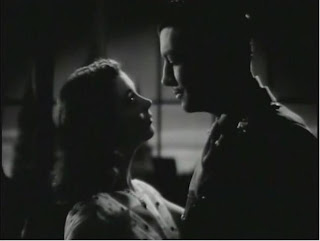 2.) Waterloo Bridge (Mervyn LeRoy, 1940): I've never seen the pre-Code original of this one, though I've read many times that that 1931 film is superior. I can only guess it's because the earlier film doesn't refuse to mention the heroine's profession (the oldest one, in this case), and doesn't waste time on any of that dreamy 1940s romanticism. Apparently the older film is better because it's "modern," "grittier," more "sexually frank," more "open" in its subject matter and unwilling to sugarcoat the harsh realities of life. Okay, whatever. Give me lush romance, tragic heroines, candlelit dances, "Auld Lang Syne," and characters who can't bear to utter the scandalous word "prostitute," over some dreary early '30s social drama about a hooker with a heart of brass (and yes, I realize I'm being unfair to a movie I've never seen). I much prefer Vivien Leigh's tragic dancer Myra, whose heartbreak and fatalism lead her to a life of prostitution, than a pre-Code Myra who has always been a prostitute, but who falls in love with a naive boy and wants to change for his sake but knows it's too late, the set-up of so many "a prostitute makes nice" stories. Leigh's Myra is a strange bird, a young girl with no family and ambitions to dance, a beautiful girl who at the same time has a morose quality, an inkling of the possible futility of life, that gives her a deep, complex sadness. Robert Taylor, a man of action, a child of privilege who bounds through life with reckless abandon, and yet he's drawn to the sad, strangely mature, delicately beautiful girl. And of course, it's all heartbreak and ill-fate. I could write pages about this movie, and maybe someday I will. But at least I can share my love with the Chinese, who apparently love this movie, since it was one of the first American films they were able to see after the war ended. I'll just end by saying, there's a scene in this movie (at a candlelit restaurant) that is perhaps one of the most romantic ever put to screen. And yes, I'll stand by that overstatement!
2.) Waterloo Bridge (Mervyn LeRoy, 1940): I've never seen the pre-Code original of this one, though I've read many times that that 1931 film is superior. I can only guess it's because the earlier film doesn't refuse to mention the heroine's profession (the oldest one, in this case), and doesn't waste time on any of that dreamy 1940s romanticism. Apparently the older film is better because it's "modern," "grittier," more "sexually frank," more "open" in its subject matter and unwilling to sugarcoat the harsh realities of life. Okay, whatever. Give me lush romance, tragic heroines, candlelit dances, "Auld Lang Syne," and characters who can't bear to utter the scandalous word "prostitute," over some dreary early '30s social drama about a hooker with a heart of brass (and yes, I realize I'm being unfair to a movie I've never seen). I much prefer Vivien Leigh's tragic dancer Myra, whose heartbreak and fatalism lead her to a life of prostitution, than a pre-Code Myra who has always been a prostitute, but who falls in love with a naive boy and wants to change for his sake but knows it's too late, the set-up of so many "a prostitute makes nice" stories. Leigh's Myra is a strange bird, a young girl with no family and ambitions to dance, a beautiful girl who at the same time has a morose quality, an inkling of the possible futility of life, that gives her a deep, complex sadness. Robert Taylor, a man of action, a child of privilege who bounds through life with reckless abandon, and yet he's drawn to the sad, strangely mature, delicately beautiful girl. And of course, it's all heartbreak and ill-fate. I could write pages about this movie, and maybe someday I will. But at least I can share my love with the Chinese, who apparently love this movie, since it was one of the first American films they were able to see after the war ended. I'll just end by saying, there's a scene in this movie (at a candlelit restaurant) that is perhaps one of the most romantic ever put to screen. And yes, I'll stand by that overstatement!
 3.) Libeled Lady (Jack Conway, 1936): I just really love William Powell and Myrna Loy together, and this is one of their best non-Thin Man movies. Jean Harlow gets to let fly some pretty good zingers. Spencer Tracy is playing one of my favorite 1930s movie types, the hard-boiled reporter who seems to only care about the paper and not his girl, but in the end we know he's just a big softy who's deep in love with his long-suffering lady. But it's Powell and Loy I watch for, and it's Powell and Loy I love. Their on-screen chemistry is so natural, so electric, so sexy and yet still so beguilingly normal, you feel like you're just watching two ordinary people in love, and who are so interesting you just can't take your eyes off them. This movie is more a comedy of errors than it is a true screwball comedy, but it often gets compared unfavorably to the classic screwballs of the era like My Man Godfrey or Bringing Up Baby as being a lightweight of the genre. That's too bad, because Libeled Lady has a pretty witty script, and is able to be funny without being zany (though Powell's battle with a walleye is slapstick at its best). The characters are more realistic than your average screwball denizen (though Harlow's brassy Gladys and Tracy's hard-nosed Haggerty are still somewhat ridiculous, this being, after all, a comedy). Having more down-to-earth characters means the film has some great quiet moments, especially between Loy and Powell, that are tender and touching.
3.) Libeled Lady (Jack Conway, 1936): I just really love William Powell and Myrna Loy together, and this is one of their best non-Thin Man movies. Jean Harlow gets to let fly some pretty good zingers. Spencer Tracy is playing one of my favorite 1930s movie types, the hard-boiled reporter who seems to only care about the paper and not his girl, but in the end we know he's just a big softy who's deep in love with his long-suffering lady. But it's Powell and Loy I watch for, and it's Powell and Loy I love. Their on-screen chemistry is so natural, so electric, so sexy and yet still so beguilingly normal, you feel like you're just watching two ordinary people in love, and who are so interesting you just can't take your eyes off them. This movie is more a comedy of errors than it is a true screwball comedy, but it often gets compared unfavorably to the classic screwballs of the era like My Man Godfrey or Bringing Up Baby as being a lightweight of the genre. That's too bad, because Libeled Lady has a pretty witty script, and is able to be funny without being zany (though Powell's battle with a walleye is slapstick at its best). The characters are more realistic than your average screwball denizen (though Harlow's brassy Gladys and Tracy's hard-nosed Haggerty are still somewhat ridiculous, this being, after all, a comedy). Having more down-to-earth characters means the film has some great quiet moments, especially between Loy and Powell, that are tender and touching.
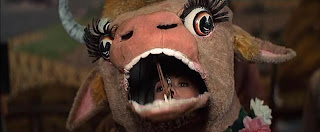 4.) Gypsy (Mervyn LeRoy, 1962): I know we're supposed to complain about Rosalind Russell getting the part over Merman; I know we're supposed to think Mervyn LeRoy is an average director and the film doesn't have much visual flair, especially in comparison to the great Freed Unit MGM musicals; I know we're supposed to condemn the singing, since Roz couldn't do her own, and the dubbed voice by Lisa Kirk is only "okay" (and too deep), and Natalie Wood had a pretty enough voice but it was just too thin -- I know all this, and how Gypsy was the beginning of the end of the era of successful musicals in Hollywood. But, well, sometimes we watch a movie in our youth and it's a transcendent experience, and even if we know we should know better, we can't help loving it unreservedly, because it's a part of us, a singular artistic experience with transformative power. I was in my early teens, with a secret dream of going into show business, of "making it big," and Gypsy, an almost forbidden pleasure, watching it past midnight on a school night, spoke directly to my inner Rose. If there's one movie on this list that's a "movie that's important to me," Gypsy is it. I wish I could say my important-to-me movie was a great classic, something impressive, like The Rules of the Game, but it's not, it's a second-rate musical from a non-auteur, with a star -- Russell -- who many claim was wrong for the part. But movies that shape us, that grab hold of us and change us, are often not the movies we expect. At thirteen years old, in those dangerous hours past midnight, I had Gypsy.
4.) Gypsy (Mervyn LeRoy, 1962): I know we're supposed to complain about Rosalind Russell getting the part over Merman; I know we're supposed to think Mervyn LeRoy is an average director and the film doesn't have much visual flair, especially in comparison to the great Freed Unit MGM musicals; I know we're supposed to condemn the singing, since Roz couldn't do her own, and the dubbed voice by Lisa Kirk is only "okay" (and too deep), and Natalie Wood had a pretty enough voice but it was just too thin -- I know all this, and how Gypsy was the beginning of the end of the era of successful musicals in Hollywood. But, well, sometimes we watch a movie in our youth and it's a transcendent experience, and even if we know we should know better, we can't help loving it unreservedly, because it's a part of us, a singular artistic experience with transformative power. I was in my early teens, with a secret dream of going into show business, of "making it big," and Gypsy, an almost forbidden pleasure, watching it past midnight on a school night, spoke directly to my inner Rose. If there's one movie on this list that's a "movie that's important to me," Gypsy is it. I wish I could say my important-to-me movie was a great classic, something impressive, like The Rules of the Game, but it's not, it's a second-rate musical from a non-auteur, with a star -- Russell -- who many claim was wrong for the part. But movies that shape us, that grab hold of us and change us, are often not the movies we expect. At thirteen years old, in those dangerous hours past midnight, I had Gypsy.

So that's my night of movies in fantasy TCM-land. Anyone else willing to pick their four? Believe me, it's hard to limit yourself to just a quartet.
 1.) The Strawberry Blonde (Raoul Walsh, 1941): This is one of the reasons I love the Golden Age of Hollywood. A movie that's simply entertaining, with Cagney, DeHavilland, Carson, and Hayworth all at the top of their game. Funny, romantic, wistful, true to the small and great ironies of life, insightful about human faults and vanities -- simply a well-made and well-told story. It's not an ambitious film like Citizen Kane or Gone with the Wind; it's not one of those accidental miracles that resulted in cultural immortality like Casablanca or The Wizard of Oz; it's not an iconic film for any of its four stars. And yet at the end of the day, I never get tired of this movie. Every time -- and I mean every time -- this movie is on television (it's not on DVD... grrrr) I sit and watch it. I think I've seen it close to seven or eight times, and I could watch it a dozen more. It's the epitome of classic studio era movie-making: Nothing spectacular or groundbreaking, simply a really, really good and entertaining movie. Utterly enjoyable.
1.) The Strawberry Blonde (Raoul Walsh, 1941): This is one of the reasons I love the Golden Age of Hollywood. A movie that's simply entertaining, with Cagney, DeHavilland, Carson, and Hayworth all at the top of their game. Funny, romantic, wistful, true to the small and great ironies of life, insightful about human faults and vanities -- simply a well-made and well-told story. It's not an ambitious film like Citizen Kane or Gone with the Wind; it's not one of those accidental miracles that resulted in cultural immortality like Casablanca or The Wizard of Oz; it's not an iconic film for any of its four stars. And yet at the end of the day, I never get tired of this movie. Every time -- and I mean every time -- this movie is on television (it's not on DVD... grrrr) I sit and watch it. I think I've seen it close to seven or eight times, and I could watch it a dozen more. It's the epitome of classic studio era movie-making: Nothing spectacular or groundbreaking, simply a really, really good and entertaining movie. Utterly enjoyable. 2.) Waterloo Bridge (Mervyn LeRoy, 1940): I've never seen the pre-Code original of this one, though I've read many times that that 1931 film is superior. I can only guess it's because the earlier film doesn't refuse to mention the heroine's profession (the oldest one, in this case), and doesn't waste time on any of that dreamy 1940s romanticism. Apparently the older film is better because it's "modern," "grittier," more "sexually frank," more "open" in its subject matter and unwilling to sugarcoat the harsh realities of life. Okay, whatever. Give me lush romance, tragic heroines, candlelit dances, "Auld Lang Syne," and characters who can't bear to utter the scandalous word "prostitute," over some dreary early '30s social drama about a hooker with a heart of brass (and yes, I realize I'm being unfair to a movie I've never seen). I much prefer Vivien Leigh's tragic dancer Myra, whose heartbreak and fatalism lead her to a life of prostitution, than a pre-Code Myra who has always been a prostitute, but who falls in love with a naive boy and wants to change for his sake but knows it's too late, the set-up of so many "a prostitute makes nice" stories. Leigh's Myra is a strange bird, a young girl with no family and ambitions to dance, a beautiful girl who at the same time has a morose quality, an inkling of the possible futility of life, that gives her a deep, complex sadness. Robert Taylor, a man of action, a child of privilege who bounds through life with reckless abandon, and yet he's drawn to the sad, strangely mature, delicately beautiful girl. And of course, it's all heartbreak and ill-fate. I could write pages about this movie, and maybe someday I will. But at least I can share my love with the Chinese, who apparently love this movie, since it was one of the first American films they were able to see after the war ended. I'll just end by saying, there's a scene in this movie (at a candlelit restaurant) that is perhaps one of the most romantic ever put to screen. And yes, I'll stand by that overstatement!
2.) Waterloo Bridge (Mervyn LeRoy, 1940): I've never seen the pre-Code original of this one, though I've read many times that that 1931 film is superior. I can only guess it's because the earlier film doesn't refuse to mention the heroine's profession (the oldest one, in this case), and doesn't waste time on any of that dreamy 1940s romanticism. Apparently the older film is better because it's "modern," "grittier," more "sexually frank," more "open" in its subject matter and unwilling to sugarcoat the harsh realities of life. Okay, whatever. Give me lush romance, tragic heroines, candlelit dances, "Auld Lang Syne," and characters who can't bear to utter the scandalous word "prostitute," over some dreary early '30s social drama about a hooker with a heart of brass (and yes, I realize I'm being unfair to a movie I've never seen). I much prefer Vivien Leigh's tragic dancer Myra, whose heartbreak and fatalism lead her to a life of prostitution, than a pre-Code Myra who has always been a prostitute, but who falls in love with a naive boy and wants to change for his sake but knows it's too late, the set-up of so many "a prostitute makes nice" stories. Leigh's Myra is a strange bird, a young girl with no family and ambitions to dance, a beautiful girl who at the same time has a morose quality, an inkling of the possible futility of life, that gives her a deep, complex sadness. Robert Taylor, a man of action, a child of privilege who bounds through life with reckless abandon, and yet he's drawn to the sad, strangely mature, delicately beautiful girl. And of course, it's all heartbreak and ill-fate. I could write pages about this movie, and maybe someday I will. But at least I can share my love with the Chinese, who apparently love this movie, since it was one of the first American films they were able to see after the war ended. I'll just end by saying, there's a scene in this movie (at a candlelit restaurant) that is perhaps one of the most romantic ever put to screen. And yes, I'll stand by that overstatement! 3.) Libeled Lady (Jack Conway, 1936): I just really love William Powell and Myrna Loy together, and this is one of their best non-Thin Man movies. Jean Harlow gets to let fly some pretty good zingers. Spencer Tracy is playing one of my favorite 1930s movie types, the hard-boiled reporter who seems to only care about the paper and not his girl, but in the end we know he's just a big softy who's deep in love with his long-suffering lady. But it's Powell and Loy I watch for, and it's Powell and Loy I love. Their on-screen chemistry is so natural, so electric, so sexy and yet still so beguilingly normal, you feel like you're just watching two ordinary people in love, and who are so interesting you just can't take your eyes off them. This movie is more a comedy of errors than it is a true screwball comedy, but it often gets compared unfavorably to the classic screwballs of the era like My Man Godfrey or Bringing Up Baby as being a lightweight of the genre. That's too bad, because Libeled Lady has a pretty witty script, and is able to be funny without being zany (though Powell's battle with a walleye is slapstick at its best). The characters are more realistic than your average screwball denizen (though Harlow's brassy Gladys and Tracy's hard-nosed Haggerty are still somewhat ridiculous, this being, after all, a comedy). Having more down-to-earth characters means the film has some great quiet moments, especially between Loy and Powell, that are tender and touching.
3.) Libeled Lady (Jack Conway, 1936): I just really love William Powell and Myrna Loy together, and this is one of their best non-Thin Man movies. Jean Harlow gets to let fly some pretty good zingers. Spencer Tracy is playing one of my favorite 1930s movie types, the hard-boiled reporter who seems to only care about the paper and not his girl, but in the end we know he's just a big softy who's deep in love with his long-suffering lady. But it's Powell and Loy I watch for, and it's Powell and Loy I love. Their on-screen chemistry is so natural, so electric, so sexy and yet still so beguilingly normal, you feel like you're just watching two ordinary people in love, and who are so interesting you just can't take your eyes off them. This movie is more a comedy of errors than it is a true screwball comedy, but it often gets compared unfavorably to the classic screwballs of the era like My Man Godfrey or Bringing Up Baby as being a lightweight of the genre. That's too bad, because Libeled Lady has a pretty witty script, and is able to be funny without being zany (though Powell's battle with a walleye is slapstick at its best). The characters are more realistic than your average screwball denizen (though Harlow's brassy Gladys and Tracy's hard-nosed Haggerty are still somewhat ridiculous, this being, after all, a comedy). Having more down-to-earth characters means the film has some great quiet moments, especially between Loy and Powell, that are tender and touching. 4.) Gypsy (Mervyn LeRoy, 1962): I know we're supposed to complain about Rosalind Russell getting the part over Merman; I know we're supposed to think Mervyn LeRoy is an average director and the film doesn't have much visual flair, especially in comparison to the great Freed Unit MGM musicals; I know we're supposed to condemn the singing, since Roz couldn't do her own, and the dubbed voice by Lisa Kirk is only "okay" (and too deep), and Natalie Wood had a pretty enough voice but it was just too thin -- I know all this, and how Gypsy was the beginning of the end of the era of successful musicals in Hollywood. But, well, sometimes we watch a movie in our youth and it's a transcendent experience, and even if we know we should know better, we can't help loving it unreservedly, because it's a part of us, a singular artistic experience with transformative power. I was in my early teens, with a secret dream of going into show business, of "making it big," and Gypsy, an almost forbidden pleasure, watching it past midnight on a school night, spoke directly to my inner Rose. If there's one movie on this list that's a "movie that's important to me," Gypsy is it. I wish I could say my important-to-me movie was a great classic, something impressive, like The Rules of the Game, but it's not, it's a second-rate musical from a non-auteur, with a star -- Russell -- who many claim was wrong for the part. But movies that shape us, that grab hold of us and change us, are often not the movies we expect. At thirteen years old, in those dangerous hours past midnight, I had Gypsy.
4.) Gypsy (Mervyn LeRoy, 1962): I know we're supposed to complain about Rosalind Russell getting the part over Merman; I know we're supposed to think Mervyn LeRoy is an average director and the film doesn't have much visual flair, especially in comparison to the great Freed Unit MGM musicals; I know we're supposed to condemn the singing, since Roz couldn't do her own, and the dubbed voice by Lisa Kirk is only "okay" (and too deep), and Natalie Wood had a pretty enough voice but it was just too thin -- I know all this, and how Gypsy was the beginning of the end of the era of successful musicals in Hollywood. But, well, sometimes we watch a movie in our youth and it's a transcendent experience, and even if we know we should know better, we can't help loving it unreservedly, because it's a part of us, a singular artistic experience with transformative power. I was in my early teens, with a secret dream of going into show business, of "making it big," and Gypsy, an almost forbidden pleasure, watching it past midnight on a school night, spoke directly to my inner Rose. If there's one movie on this list that's a "movie that's important to me," Gypsy is it. I wish I could say my important-to-me movie was a great classic, something impressive, like The Rules of the Game, but it's not, it's a second-rate musical from a non-auteur, with a star -- Russell -- who many claim was wrong for the part. But movies that shape us, that grab hold of us and change us, are often not the movies we expect. At thirteen years old, in those dangerous hours past midnight, I had Gypsy.
So that's my night of movies in fantasy TCM-land. Anyone else willing to pick their four? Believe me, it's hard to limit yourself to just a quartet.
Labels:
gypsy,
libeled lady,
movie love,
strawberry blonde,
TCM,
television,
waterloo bridge
Monday, June 18, 2007
Quote of the Week
"I think acting should look as if we're working a little. Which is a very old-fashioned theory today. See, we mustn't have any idea that anybody knows the camera's on them at all. You see, it's just 'life.' Well, we all have life, twenty-four... twelve hours a day. Sometimes we want to forget life. I think it should be a little larger than life. A little bit theatrical."
Bette Davis
Bette Davis
Wednesday, June 13, 2007
VERLANDER!!!
Monday, June 11, 2007
Film and Sports

Interleague play meets Hitchcock! Birds descended on Comerica Park yesterday and it was kinda hilarious. This is the ESPN recap of the game, and make sure to watch the video highlights to see the full effect of the birds. It's been reported that when Tiger's reliever Tim BYRDak came into the game, the gulls were somewhat pacified. At any rate, go Tigers!

Beware of birds!

Thursday, May 31, 2007
Fantasia Will Amazia!
I fell asleep during Fantasia. It was re-released in 1990 for a 50th anniversary, I was nine and the daughter of a classical music buff (my mom), and so we saw it. Most lasting memory of the film? This image:

Yes, practically the first image of the film, I know. But at nine years old Fantasia is a little tough to take in a movie theater setting: you can't stop the movie for a lunch break or to run around outside for a few hours, you just have to sit there in the darkened cavern and try not to fall asleep. That silhouetted image of Stokowski was pretty powerful though; it stayed with me and not just because it was the first scene of the movie. There's something elemental about that shot, something basic. Who is he conducting? Who is he? The silhouette, the glowing blue background, it's almost like he's a phantom, a shade, calling forth images from some netherworld. I don't think it's an accident that the film includes sequences like the Sorcerer's Apprentice, or the Rite of Spring in which the conductor seems to be bringing the very world into existence, from a blue nothingness to a world teeming with life and dinosaurs. Watching the movie today, I still get a little thrill from seeing the conductor raise his shadowed arms. This is one of the reasons I wanted to do a childhood movie series, to re-experience those thrills, to remember what it was like to watch movies as a child and to see if the movies might still work their same magic, even now, some ten or fifteen years later.
I've seen Fantasia since that day seventeen years ago. In fact, I remember getting the VHS tape out on many a lazy summer vacation day just to watch the Night On Bald Mountain sequence over and over again. And I do remember watching the Sorcerer's Apprentice section of the film in the theater, as well as the funny hippos and alligators do their Dance of the Hours ballet, and of course, A Night On Bald Mountain. I think the part that put me to sleep in the theater was the Rite of Spring section; Stravinsky's Rite of Spring is not exactly a kid-friendly piece of music (I think it's tough even for adults to get through). And I'm sure I slept straight on through the Pastoral Symphony and was only awakened by the peppiness of Ponchielli. At least, that's how I remember it. Funny, even as a kid, the most kid-friendly section -- The Sorcerer's Apprentice -- was probably my least favorite part. For some reason, it seemed so contained, so ordinary compared to the wild worlds of stuff like the nature ballet of the Nutcracker Suite or the phantasms of A Night On Bald Mountain. Mickey Mouse and inanimate objects coming to life? That seemed as ordinary to me as a Saturday morning cartoon.
Watching the movie again now, I can't say my opinion has changed about The Sorcerer's Apprentice -- still my least favorite section. Which is funny, since apparently, that section always seems to get the most praise from both critics and casual viewers alike. Though I do love this shot:
 That's pretty frightening: an army of brooms, marching in lock-step, uncontrollable, single-minded in their mission of aquatic destruction. I feel like I'm watching a Leni Riefenstahl film by way of Fleischer Studios. Also somewhat scary? This guy:
That's pretty frightening: an army of brooms, marching in lock-step, uncontrollable, single-minded in their mission of aquatic destruction. I feel like I'm watching a Leni Riefenstahl film by way of Fleischer Studios. Also somewhat scary? This guy:
 According to the animators interviewed on the DVD re-release documentary, this cocked-eyebrow face was modeled after a face Walt Disney himself often made. I once dreamed of being a Disney animator, but I wouldn't have wanted to see that creepy eyebrow pop up whenever Uncle Walt was displeased with my work.
According to the animators interviewed on the DVD re-release documentary, this cocked-eyebrow face was modeled after a face Walt Disney himself often made. I once dreamed of being a Disney animator, but I wouldn't have wanted to see that creepy eyebrow pop up whenever Uncle Walt was displeased with my work.
Even though the Sorcerer's Apprentice wasn't and isn't my favorite part of the movie, I did spend a lot of time copying Mickey's image from it. Like I said, I wanted to be to be a Disney animator when I was between the ages of seven and eleven. I spent hours copying this image:
 I think I remember it so clearly because it was one of the first things I drew free-hand that people thought I had traced. Nope! All done free-hand, no tracing for me! At nine years old, I was so proud.
I think I remember it so clearly because it was one of the first things I drew free-hand that people thought I had traced. Nope! All done free-hand, no tracing for me! At nine years old, I was so proud.
Watching the film again a few weeks ago, I was, frankly, kinda blown away by it. As a child, certain sections were powerful and made an indelible mark (see: Night On Bald Mountain), but the film as a whole wasn't something I remember wanting to watch, the way one would want to pop in Lady and the Tramp or Back to the Future or Goonies. Watching the film now, I'm struck by, yes, certain sections (see: Night On Bald Mountain), but also by the film as a complete film. Each section could be watched individually, each separate short film existing independently of the others. But I think the sum of the film is actually greater than the parts. Or, to put it another way, I think each individual part comments on and enhances the enjoyment and understanding of all the other parts. The film starts out with Bach's Toccata and Fugue in D Minor, the "abstract" piece of music ("music for its own sake" as the film describes it) that is accompanied by meshes of color and squiggly lines and generally abstract animation, but notice this image towards the end of the piece:

In this piece, "pure" music with no story or dominant idea contained within the music itself, and the Disney animators happen to stick a sunrise/sunset into the thing. Later on the sun will show up as a destroyer of the dinosaurs in the Rite of Spring section:

After Zeus's thunderstorm in the Pastoral Symphony:

And then finally, the last shot of the film, after the nightmares and spectres of Bald Mountain have gone back to their shadows, the pilgrims make their journey through the forest with lighted lamps (metaphors for the sun?) as Schubert's Ave Maria weaves its way into the soundtrack, and they walk into a cathedral made of trees, which open up to reveal the rising sun in all its glory. The music builds, the light grows stronger, and at last, a sunrise, an eternal symbol of hope and the film ends:



And gosh, don't those hills look a little bit like those weird rolling hills from the first section, the Bach Toccata and Fugue?:

The sun imagery is just one repeating theme throughout the film, and I think nature imagery as a whole is the dominant visual theme of the movie. Nature as living thing, maybe even magical (Nutcracker Suite); nature as volatile force, creator and destroyer (Rite of Spring); nature as divine (Pastoral Symphony); nature as healer, giver of hope (Ave Maria). There is also the theme of creative forces, which I mentioned earlier, of creating new life, as represented in the Rite of Spring section and the Sorcerer's Apprentice section. Even in the Toccata and Fugue abstract section, there's a sense that the music itself is somehow willing these images into existence. And the section least thematically tied to the others -- the Dance of the Hours comedy -- still has in the background the changing times of the day: the brightness of midday, the pallor of dusk, the haunted dark of night (which, of course, happens right before the Night On Bald Mountain sequence -- again, each section builds on and comments on the others).
I watched the movie twice in two days when I rented it recently -- a response I was not expecting, frankly. And then I watched it in pieces again for a third time, and each time I watched it I noticed something new, or I caught a new connection, or a new theme. I even noticed things that I've seen echoed elsewhere in other films. This image, for instance:
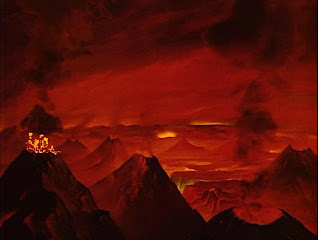
looks almost identical to the last image of Peter Jackson's The Two Towers (minus the nazgul and fell beasts, of course), where the camera pans up and reveals a hellish shot of Mordor, looking like something out of Dante's Inferno (or now, as I see, out of Disney's Fantasia).
I mentioned the word "elemental" earlier, in reference to the silhouetted conductor's image, and I think that word sums up the experience pretty well. It's animation and cinema on that pure level, on the level of just moving images, as if one is seeing color and line and form all explode for the first time. The emotions and themes of the piece are basic as well:
Fear:

Life:

Death:

Beauty:

Joy:
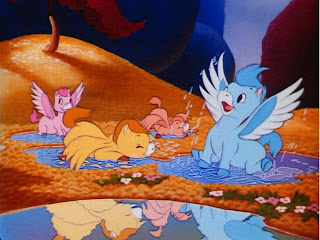
Evil:
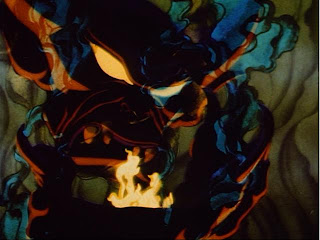
I have to say, I was exhilarated after watching the film recently. I know Pauline Kael called it kitsch, but, if it is, it's the most dazzling, ambitious, and thrilling kitsch I've seen in a long time. There's a sense, after watching it, that one's just witnessed the birth of some new kind of life.

Yes, practically the first image of the film, I know. But at nine years old Fantasia is a little tough to take in a movie theater setting: you can't stop the movie for a lunch break or to run around outside for a few hours, you just have to sit there in the darkened cavern and try not to fall asleep. That silhouetted image of Stokowski was pretty powerful though; it stayed with me and not just because it was the first scene of the movie. There's something elemental about that shot, something basic. Who is he conducting? Who is he? The silhouette, the glowing blue background, it's almost like he's a phantom, a shade, calling forth images from some netherworld. I don't think it's an accident that the film includes sequences like the Sorcerer's Apprentice, or the Rite of Spring in which the conductor seems to be bringing the very world into existence, from a blue nothingness to a world teeming with life and dinosaurs. Watching the movie today, I still get a little thrill from seeing the conductor raise his shadowed arms. This is one of the reasons I wanted to do a childhood movie series, to re-experience those thrills, to remember what it was like to watch movies as a child and to see if the movies might still work their same magic, even now, some ten or fifteen years later.
I've seen Fantasia since that day seventeen years ago. In fact, I remember getting the VHS tape out on many a lazy summer vacation day just to watch the Night On Bald Mountain sequence over and over again. And I do remember watching the Sorcerer's Apprentice section of the film in the theater, as well as the funny hippos and alligators do their Dance of the Hours ballet, and of course, A Night On Bald Mountain. I think the part that put me to sleep in the theater was the Rite of Spring section; Stravinsky's Rite of Spring is not exactly a kid-friendly piece of music (I think it's tough even for adults to get through). And I'm sure I slept straight on through the Pastoral Symphony and was only awakened by the peppiness of Ponchielli. At least, that's how I remember it. Funny, even as a kid, the most kid-friendly section -- The Sorcerer's Apprentice -- was probably my least favorite part. For some reason, it seemed so contained, so ordinary compared to the wild worlds of stuff like the nature ballet of the Nutcracker Suite or the phantasms of A Night On Bald Mountain. Mickey Mouse and inanimate objects coming to life? That seemed as ordinary to me as a Saturday morning cartoon.
Watching the movie again now, I can't say my opinion has changed about The Sorcerer's Apprentice -- still my least favorite section. Which is funny, since apparently, that section always seems to get the most praise from both critics and casual viewers alike. Though I do love this shot:
 That's pretty frightening: an army of brooms, marching in lock-step, uncontrollable, single-minded in their mission of aquatic destruction. I feel like I'm watching a Leni Riefenstahl film by way of Fleischer Studios. Also somewhat scary? This guy:
That's pretty frightening: an army of brooms, marching in lock-step, uncontrollable, single-minded in their mission of aquatic destruction. I feel like I'm watching a Leni Riefenstahl film by way of Fleischer Studios. Also somewhat scary? This guy: According to the animators interviewed on the DVD re-release documentary, this cocked-eyebrow face was modeled after a face Walt Disney himself often made. I once dreamed of being a Disney animator, but I wouldn't have wanted to see that creepy eyebrow pop up whenever Uncle Walt was displeased with my work.
According to the animators interviewed on the DVD re-release documentary, this cocked-eyebrow face was modeled after a face Walt Disney himself often made. I once dreamed of being a Disney animator, but I wouldn't have wanted to see that creepy eyebrow pop up whenever Uncle Walt was displeased with my work.Even though the Sorcerer's Apprentice wasn't and isn't my favorite part of the movie, I did spend a lot of time copying Mickey's image from it. Like I said, I wanted to be to be a Disney animator when I was between the ages of seven and eleven. I spent hours copying this image:
 I think I remember it so clearly because it was one of the first things I drew free-hand that people thought I had traced. Nope! All done free-hand, no tracing for me! At nine years old, I was so proud.
I think I remember it so clearly because it was one of the first things I drew free-hand that people thought I had traced. Nope! All done free-hand, no tracing for me! At nine years old, I was so proud.Watching the film again a few weeks ago, I was, frankly, kinda blown away by it. As a child, certain sections were powerful and made an indelible mark (see: Night On Bald Mountain), but the film as a whole wasn't something I remember wanting to watch, the way one would want to pop in Lady and the Tramp or Back to the Future or Goonies. Watching the film now, I'm struck by, yes, certain sections (see: Night On Bald Mountain), but also by the film as a complete film. Each section could be watched individually, each separate short film existing independently of the others. But I think the sum of the film is actually greater than the parts. Or, to put it another way, I think each individual part comments on and enhances the enjoyment and understanding of all the other parts. The film starts out with Bach's Toccata and Fugue in D Minor, the "abstract" piece of music ("music for its own sake" as the film describes it) that is accompanied by meshes of color and squiggly lines and generally abstract animation, but notice this image towards the end of the piece:

In this piece, "pure" music with no story or dominant idea contained within the music itself, and the Disney animators happen to stick a sunrise/sunset into the thing. Later on the sun will show up as a destroyer of the dinosaurs in the Rite of Spring section:

After Zeus's thunderstorm in the Pastoral Symphony:

And then finally, the last shot of the film, after the nightmares and spectres of Bald Mountain have gone back to their shadows, the pilgrims make their journey through the forest with lighted lamps (metaphors for the sun?) as Schubert's Ave Maria weaves its way into the soundtrack, and they walk into a cathedral made of trees, which open up to reveal the rising sun in all its glory. The music builds, the light grows stronger, and at last, a sunrise, an eternal symbol of hope and the film ends:



And gosh, don't those hills look a little bit like those weird rolling hills from the first section, the Bach Toccata and Fugue?:

The sun imagery is just one repeating theme throughout the film, and I think nature imagery as a whole is the dominant visual theme of the movie. Nature as living thing, maybe even magical (Nutcracker Suite); nature as volatile force, creator and destroyer (Rite of Spring); nature as divine (Pastoral Symphony); nature as healer, giver of hope (Ave Maria). There is also the theme of creative forces, which I mentioned earlier, of creating new life, as represented in the Rite of Spring section and the Sorcerer's Apprentice section. Even in the Toccata and Fugue abstract section, there's a sense that the music itself is somehow willing these images into existence. And the section least thematically tied to the others -- the Dance of the Hours comedy -- still has in the background the changing times of the day: the brightness of midday, the pallor of dusk, the haunted dark of night (which, of course, happens right before the Night On Bald Mountain sequence -- again, each section builds on and comments on the others).
I watched the movie twice in two days when I rented it recently -- a response I was not expecting, frankly. And then I watched it in pieces again for a third time, and each time I watched it I noticed something new, or I caught a new connection, or a new theme. I even noticed things that I've seen echoed elsewhere in other films. This image, for instance:

looks almost identical to the last image of Peter Jackson's The Two Towers (minus the nazgul and fell beasts, of course), where the camera pans up and reveals a hellish shot of Mordor, looking like something out of Dante's Inferno (or now, as I see, out of Disney's Fantasia).
I mentioned the word "elemental" earlier, in reference to the silhouetted conductor's image, and I think that word sums up the experience pretty well. It's animation and cinema on that pure level, on the level of just moving images, as if one is seeing color and line and form all explode for the first time. The emotions and themes of the piece are basic as well:
Fear:

Life:

Death:

Beauty:

Joy:

Evil:

I have to say, I was exhilarated after watching the film recently. I know Pauline Kael called it kitsch, but, if it is, it's the most dazzling, ambitious, and thrilling kitsch I've seen in a long time. There's a sense, after watching it, that one's just witnessed the birth of some new kind of life.
Tuesday, May 29, 2007
Monday, May 28, 2007
Whenever I Go Blog Rolling, I Always (BLANK) Victor Morton
Victor over at Rightwing Film Geek returns to blogging with a nice tribute to Charles Nelson Reilly and the awesomeness of Match Game:
Wikipedia claims that MATCH GAME "pushed the boundaries of 1970s television standards." That may be the case, but it misses the point that the boundaries remained and were, in fact, key to what made their bickering so funny and so enduring. Charles and Brett and Richard and Gene were brilliant comedians because they knew how to deliver a dirty joke in a clean way, in the classic double entendre, which has become a lost art as content standards have waned. But this pre-pubescent MATCH GAME fan remembers all the innuendo (which the adult fan well catches) going over his head. In fact, what is very much part of the fun (watching it now at 40) is appreciating the tension in how the MATCH GAME team were so deft as to get away with so much while keeping the surface G-rated. Sex and sexuality are legitimate subjects for humor, and I have no per se moral problem with locker-room jokes. But the double entendre is not only funny, but respects the innocence of some in the audience through its "double meaning" (in a slightly different context, Ernst Lubitsch noted that if you tell the audience "2 and 2," they don't need to be told "4"). But when comedians can say whatever they want, you don't need a Bocaccio to write in "The Decameron" of a randy groundskeeper at a convent that "he tended all their gardens."
I was a teenager when I experienced the genius of Match Game, watching reruns on the Game Show Network with my mom. At first I thought it was hilariously tacky in the way so much of mainstream 70s culture seems to those of us who had our childhoods in the now ironically hip 80s. But the more I've watched it, and the older I've gotten, the more I'm convinced that my grandparents' generation was a lot cooler, a lot funnier, and a lot smarter and more sophisticated than anything my generation could hope to achieve.
Michael Gerardi also gets back in the game with a review of The Freshman and reminds me I should go watch the DVD of that movie I recorded a few weeks ago.
I'm sure everyone's already seen this, but it's new to me: Classic movies and others get the Grindhouse treatment! Example:

That Little Round-Headed Boy discovers Howard Hawks's Scarface, David Bordwell and Co. discuss movie sequels and RightWingTrash celebrates the Addams Family's contribution toward winning the Cold War:
Of course, Lurch turns out to be the opposite of what Haan imagines as a “poor weak victim of exploitation.” The butler carries around a cigar-store Indian to see who cares for a smoke. This is the same Indian that Klarpe was examining closely before with much distaste. The Addams family would get a similar reaction if Sheryl Crow came by for a visit.
The Russians decide that Lurch is a robot. Harris tries to explain the truth, but can’t convince them. At least Haan and Klarpe can calm down enough to enjoy a nice lunch. They’re impressed to get caviar, but Morticia explains that they’re eating eye of tadpole. (Blue-eyed tadpole is better, Gomez adds, but it’s out of season.) Klarpe adds that American beef is fine, but not as good as in his country. Wrong again, since he’s dining on alligator.
Terry Teachout's Entries from an unkept diary:
And Jon Hastings at The Forager Blog has started his movie club.
Wikipedia claims that MATCH GAME "pushed the boundaries of 1970s television standards." That may be the case, but it misses the point that the boundaries remained and were, in fact, key to what made their bickering so funny and so enduring. Charles and Brett and Richard and Gene were brilliant comedians because they knew how to deliver a dirty joke in a clean way, in the classic double entendre, which has become a lost art as content standards have waned. But this pre-pubescent MATCH GAME fan remembers all the innuendo (which the adult fan well catches) going over his head. In fact, what is very much part of the fun (watching it now at 40) is appreciating the tension in how the MATCH GAME team were so deft as to get away with so much while keeping the surface G-rated. Sex and sexuality are legitimate subjects for humor, and I have no per se moral problem with locker-room jokes. But the double entendre is not only funny, but respects the innocence of some in the audience through its "double meaning" (in a slightly different context, Ernst Lubitsch noted that if you tell the audience "2 and 2," they don't need to be told "4"). But when comedians can say whatever they want, you don't need a Bocaccio to write in "The Decameron" of a randy groundskeeper at a convent that "he tended all their gardens."
I was a teenager when I experienced the genius of Match Game, watching reruns on the Game Show Network with my mom. At first I thought it was hilariously tacky in the way so much of mainstream 70s culture seems to those of us who had our childhoods in the now ironically hip 80s. But the more I've watched it, and the older I've gotten, the more I'm convinced that my grandparents' generation was a lot cooler, a lot funnier, and a lot smarter and more sophisticated than anything my generation could hope to achieve.
Michael Gerardi also gets back in the game with a review of The Freshman and reminds me I should go watch the DVD of that movie I recorded a few weeks ago.
I'm sure everyone's already seen this, but it's new to me: Classic movies and others get the Grindhouse treatment! Example:

That Little Round-Headed Boy discovers Howard Hawks's Scarface, David Bordwell and Co. discuss movie sequels and RightWingTrash celebrates the Addams Family's contribution toward winning the Cold War:
Of course, Lurch turns out to be the opposite of what Haan imagines as a “poor weak victim of exploitation.” The butler carries around a cigar-store Indian to see who cares for a smoke. This is the same Indian that Klarpe was examining closely before with much distaste. The Addams family would get a similar reaction if Sheryl Crow came by for a visit.
The Russians decide that Lurch is a robot. Harris tries to explain the truth, but can’t convince them. At least Haan and Klarpe can calm down enough to enjoy a nice lunch. They’re impressed to get caviar, but Morticia explains that they’re eating eye of tadpole. (Blue-eyed tadpole is better, Gomez adds, but it’s out of season.) Klarpe adds that American beef is fine, but not as good as in his country. Wrong again, since he’s dining on alligator.
Terry Teachout's Entries from an unkept diary:
Though the metaphor embodied in its nickname is long dead, everyone in the world understands that a "movie" consists of "moving pictures," and it is in the nature of a picture--a photograph--that we take for granted its unfaked reality. A century ago, our great-grandparents were scared out of their wits when one of the villains in The Great Train Robbery pointed his gun at the audience and fired it. Nowadays we're more sophisticated than that, but most of us still cling to the belief that a film is in some attenuated but still meaningful sense a record of something that actually happened, if only on a soundstage.
Will our children feel this way about film? I doubt it.And Jon Hastings at The Forager Blog has started his movie club.
Labels:
blog rolling,
charles nelson reilly,
match game,
randoms
Saturday, May 26, 2007
I Wake Up Screaming!
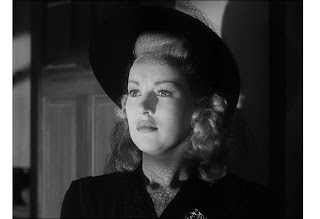 A 1941 movie with murder, obsession, ambiguous characters with hidden motives, Elisha Cook Jr., a flashback narrative structure, and shots like these:
A 1941 movie with murder, obsession, ambiguous characters with hidden motives, Elisha Cook Jr., a flashback narrative structure, and shots like these:

And it was made at practically the same time as The Maltese Falcon. Was this Betty Grable/Victor Mature vehicle from Fox more "noir" than the so-called "First Film Noir"??? Well, the happy love story stuck in the middle of the all the creepy dark stuff seems to say "no" (and who knew that "Somewhere Over the Rainbow" could get more play in this movie than in Wizard of Oz!). But wait for the end (sorry, no spoilers here) and tell me that doesn't seem as twisted as anything from the traditional Noir catalogue. Also, stylistically, it looks way more Noir than Falcon.
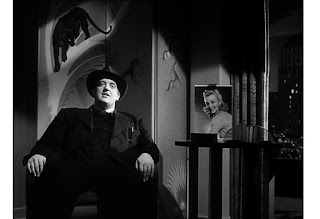
Thursday, May 24, 2007
LAME
I have a couple of questions for you LOST: Why did Charlie lock the door and basically commit suicide? Couldn't he have gotten out of the room before the bomb went off? There seemed like a lot of time between the moment Patch Guy showed up with the grenade and the time it took Charlie to lock the door, look meaningfully at Desmond, and wait an eternity for the bomb to go off. Couldn't Charlie have just gotten out of the room and let the grenade go off without locking the door? It would've taken twelve years for that cavernous hatch to fill up with water and by that time Charlie and Des could've been half-way to the island. Charlie's death, meant to be so meaningful and self-sacrificing (which it was, only needlessly so), ended up making no sense. Charlie just basically committed suicide for no reason, and it could have been remedied so easily if the writers had just decided to have the door lock behind Charlie so that he couldn't escape. Instead, they went for the extra-special-self-sacrificing version, even though Charlie's sacrifice was already heroic without this added-on really, really "heroic" (lame) stuff. It just makes Charlie look like an idiot (also, when did Charlie convert to Eastern Orthodoxy? Nice backwards sign of the cross, Chuck).
It's funny because I've always liked the Charlie character but I was actually hoping they would kill him because it would be heroic and give the character a real, meaningful death. I was actually looking forward to Charlie's death scene, one because it would be a nice way for the character to go out, and two because I like Dom Monaghan and I want him to move on from this train wreck show. Oh well (which is so often my reaction to a missed opportunity by LOST).
The problem with this scene, and with so many other moments on the show, is that the characters don't act like real people. A real person, when faced with the cryptic bullshit of the Others, would get angry, demand answers, maybe even get a little violent (which Jack finally did, thank God). Usually, the Losties just shrug their shoulders and drop it, which is just not a normal reaction. Charlie has the opportunity to save everybody and still live, and instead he basically kills himself. For what? Because Desmond said he had to die? The implication was always that Charlie had to die to save the Losties because there was no other way. But in the finale, it turns out there was another way. Several, in fact.
I'll probably still watch next season, though. I'm weak. But good for Dom that he can move on to other things. He deserves better than playing sixth banana on a sloppily written TV show.
It's funny because I've always liked the Charlie character but I was actually hoping they would kill him because it would be heroic and give the character a real, meaningful death. I was actually looking forward to Charlie's death scene, one because it would be a nice way for the character to go out, and two because I like Dom Monaghan and I want him to move on from this train wreck show. Oh well (which is so often my reaction to a missed opportunity by LOST).
The problem with this scene, and with so many other moments on the show, is that the characters don't act like real people. A real person, when faced with the cryptic bullshit of the Others, would get angry, demand answers, maybe even get a little violent (which Jack finally did, thank God). Usually, the Losties just shrug their shoulders and drop it, which is just not a normal reaction. Charlie has the opportunity to save everybody and still live, and instead he basically kills himself. For what? Because Desmond said he had to die? The implication was always that Charlie had to die to save the Losties because there was no other way. But in the finale, it turns out there was another way. Several, in fact.
I'll probably still watch next season, though. I'm weak. But good for Dom that he can move on to other things. He deserves better than playing sixth banana on a sloppily written TV show.
Wednesday, May 23, 2007
Sometimes Cinematic Perfection is Boring: Pinocchio vs. Dumbo
 Pinocchio: I remember nearly everything about the film -- as I was rewatching it for the first time in probably thirteen years, as each scene began, as each song started up, as each character arrived, it all came rushing back to me in an instant, and I remembered everything completely. It was like thirteen years had never happened, that's how clearly I remembered the film as I rewatched it. I'm convinced now that I must have watched Pinocchio A LOT as a child (though I don't remember watching it that much...) because the experience was so familiar. If nothing else, Pinocchio as a whole made a much stronger impression on me as a kid than Dumbo did. And yet, watching it now as an adult, I have to say, it's lost some of its impact. The Pleasure Island sequence in particular, a sequence that scared the pants off me as a child, doesn't seem to pack the same punch. I can certainly understand, watching the film as an adult, why and what it was about that sequence that so disturbed me as a child (I hated when people transformed into things), but now I find it doesn't even really give me a slight chill, not even in remembrance of past frights:
Pinocchio: I remember nearly everything about the film -- as I was rewatching it for the first time in probably thirteen years, as each scene began, as each song started up, as each character arrived, it all came rushing back to me in an instant, and I remembered everything completely. It was like thirteen years had never happened, that's how clearly I remembered the film as I rewatched it. I'm convinced now that I must have watched Pinocchio A LOT as a child (though I don't remember watching it that much...) because the experience was so familiar. If nothing else, Pinocchio as a whole made a much stronger impression on me as a kid than Dumbo did. And yet, watching it now as an adult, I have to say, it's lost some of its impact. The Pleasure Island sequence in particular, a sequence that scared the pants off me as a child, doesn't seem to pack the same punch. I can certainly understand, watching the film as an adult, why and what it was about that sequence that so disturbed me as a child (I hated when people transformed into things), but now I find it doesn't even really give me a slight chill, not even in remembrance of past frights:
Dumbo, on the other hand, a film I remember finding immensely sad, almost unbearably sad, but not really remembering too much else about, is, upon rewatching, a kind of delightful discovery. I know Pinocchio was painstakingly crafted and Dumbo a slapdash product; I know Pinocchio has better songs, better animation, and a better narrative; I know Dumbo plays too easily and too readily on our heartstrings, while Pinocchio has sentimentality without being cloying. But, gosh darn it, I like Dumbo better. And this isn't a "when I was a child" reaction. I'm not sure which film I liked better as a child; in fact, I think I disliked both in a way, Pinocchio for being too scary, and Dumbo for being too sad (and also a little scary -- hello clowns and pink elephants -- for some reason, this image in particular used to scare me; I'm sure this is what prompted Dumbo's mind to invent the pink elephants):
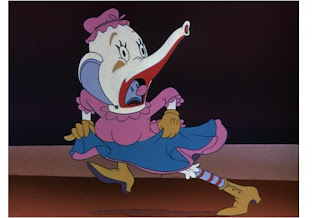
But today, Pinocchio, though I still like it very much, comes off as a little too didactic and overly cute, while Dumbo seems almost experimental, like Merrie Melodies meets Expressionism meets Charlie Chaplin meets LSD. There's a part where Timothy the mouse tells Dumbo that there are plenty of famous guys with big ears, and he doesn't mention who, but it's obvious we're meant to think of Mickey. This kind of self-referential humor is something I'd expect more from a Warner Bros. cartoon than a Disney feature film. Coming after Snow White and Pinocchio, two features that practically define the detailed, pretty, and naturalistic style of Disney animation, Dumbo really feels like the animators were trying any new thing they could think of. Take a look at this shot:
 Is this Disney or an impressionist?
Is this Disney or an impressionist?And before that we got an anthropomorphic, cartoony train:

And the use of silhouette for shots of human characters, especially the clowns, somehow made them scarier and more menacing, at least when I was seven. It was also a nice device for separating the human world and the animal world, turning the human world into a strange, unwelcome, mysterious place, and giving the viewer a real sense of the animal point of view:

It's like the animators just stuck in a bunch of crazy art things that they wanted to experiment with. Nothing shows this clearer than the Pink Elephants sequence, which comes out of nowhere, means nothing to the overall story, and yet is totally unforgettable, and for some inexplicable reason, just totally right for this movie. This is some freaky stuff, yet perfectly suitable to a story about the circus, a relatively freaky place, especially for kids:



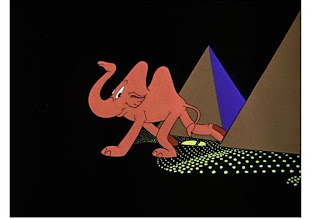
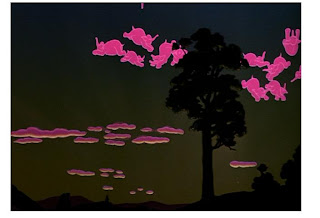 Fantasy turns back into reality but the line between them is blurred.
Fantasy turns back into reality but the line between them is blurred.Dumbo as a story, as a narrative film certainly doesn't stand up to Pinocchio, which has stronger themes and tells a more interesting story, but Dumbo is so freewheeling, and yet so basic and simple, that it has a freshness that Pinocchio, for all its true strengths as a film, can't seem to match. Pinocchio feels older, much older in fact, than Dumbo [though Dumbo is unfortunately very dated in its racist depiction of the minstrel show crows who help Dumbo learn to fly]. In that sense I'm drawn to Pinocchio because it's nostalgia in two respects: nostalgia for my own childhood, and nostalgia for a bygone era -- Pinocchio feels older than its 1940 date; it feels like something from the turn of the century was finally discovered in 1940:
 And Pinocchio does have better songs.
And Pinocchio does have better songs.Also, there's some scariness:
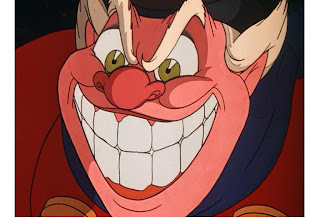
But Dumbo, for all its flaws is simply more interesting. I think my reaction to it has a lot to do with my affection for noble failures; I seem to fall in love with movies that have obvious flaws but also flashes of real brilliance. The whole is not as great as some of its parts, and yet those parts are so interesting, engaging, intriguing, whateveradjective, that I can't help but love the movie. Sometimes cinematic perfection is boring; sometimes a movie is so good that there's nothing to think about or muse over afterward. Dumbo is not like that; Dumbo is the kind of film that worms through my brain and I can't get it out. It's not so much the story or the songs but the images and essential emotions like fear, shame, sadness, and joy. Plus, who can resist this level of cuteness?

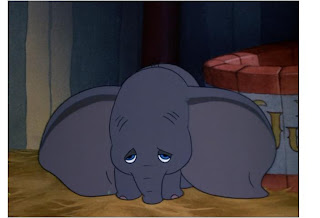
Who doesn't cry when they see this?


And who doesn't freak out over elephants in mind-bending Technicolor?

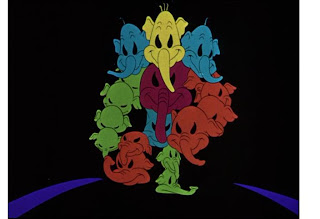

My reactions to these scenes are too strong to dismiss simply because the film is weak narratively. Pinnochio is Disney perfection, but Dumbo is Disney intoxication.
Labels:
animation,
childhood movies,
circus movies,
disney
Subscribe to:
Posts (Atom)


